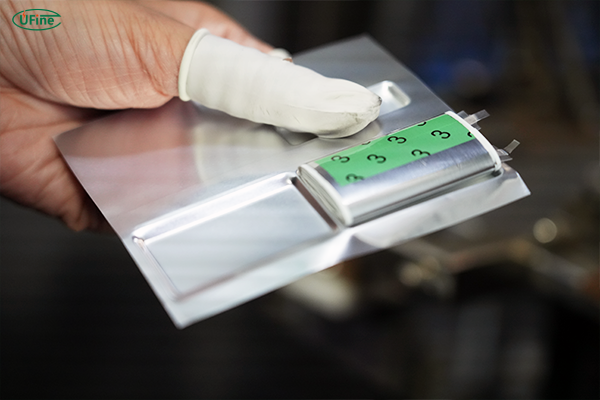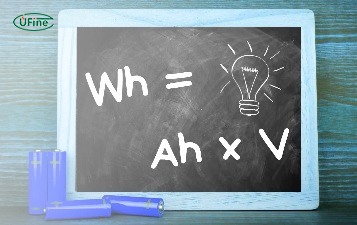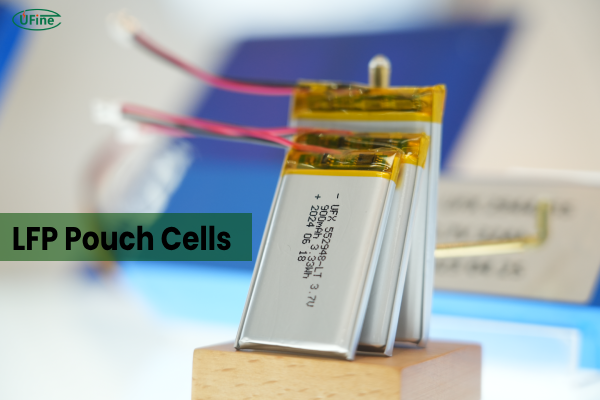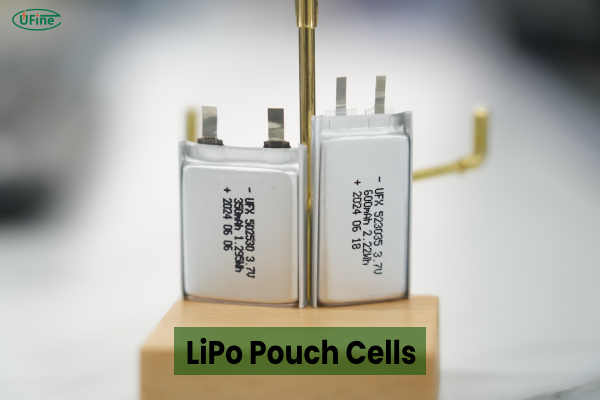
- Part 1. Principle and
- Part 2. The chemistry behind lithium pouch cells
- Part 3. Voltage and capacity
- Part 4. Key parameters to consider
- Part 5. Advantages and disadvantages
- Part 6. Lithium cell: Pouch vs prismatic vs cylindrical
- Part 7. Applications
- Part 8. Ufine Battery: trusted lithium pouch cell supplier
- Part 9. Final thoughts
- Part 10. FAQs
In today’s fast-paced world, batteries are the heartbeat of our devices. Whether it’s your phone, electric vehicle, or drone, power matters. And behind that power is something special—the lithium pouch cell. This compact, flexible battery type has quietly become the go-to solution for engineers and innovators alike. But what exactly is a pouch cell, and why is it so important?
Let’s break it down—from how it works to how to choose the right one for your needs.
Part 1. Principle and

A lithium pouch cell is a type of lithium-ion battery, but instead of using a rigid case like cylindrical or prismatic cells, it comes wrapped in a lightweight foil pouch. This simple change in packaging leads to big advantages.
At its core, the pouch cell is made up of several key parts:
- Anode (typically graphite)
- Cathode (NMC, LFP, or similar)
- Separator
- Electrolyte
These layers are either stacked or wound in a jelly-roll format, then vacuum-sealed inside the pouch. The pouch itself is made of a laminated aluminum film, which is both light and flexible, allowing manufacturers to mold the cell into various shapes and sizes.
Learn About the Cathode and Anode of the Battery
This design reduces weight and volume while maintaining high energy density. Plus, it enables better heat dissipation, which improves safety—a big win in demanding applications.
Part 2. The chemistry behind lithium pouch cells
Pouch cells can use different lithium-based chemistries, each offering unique performance characteristics. The most common include:
a. NMC (Lithium Nickel Manganese Cobalt Oxide)
This chemistry balances high energy density, long cycle life, and reasonable safety. It’s widely used in electric vehicles, smartphones, and power tools.
b. LFP (Lithium Iron Phosphate)
LFP pouch cells are known for safety, thermal stability, and long life. Though slightly lower in energy density, they’re perfect for EVs, energy storage, and solar systems.
c. NCA (Lithium Nickel Cobalt Aluminum Oxide)
This high-energy chemistry is often used in high-performance EVs like those made by Tesla.
The choice of chemistry depends on the application. For example, if you’re designing a drone, you might prioritize high energy density (NMC). For a home energy storage system, safety and longevity (LFP) may matter more.
Part 3. Voltage and capacity
Let’s talk numbers. A single lithium pouch cell typically has a nominal voltage of 3.6V to 3.7V. When fully charged, it reaches 4.2V, and at the lower limit, it drops to about 2.5V–3.0V.
As for capacity, that’s measured in milliamp-hours (mAh) or amp-hours (Ah). Higher capacity means more runtime. For instance, a 5,000mAh pouch cell could power a device for several hours, depending on its power draw.
These two numbers—voltage and capacity—determine how powerful and long-lasting a pouch cell will be in real-world use.
Part 4. Key parameters to consider
Choosing the right lithium pouch cell means understanding more than just voltage and capacity. Here are the crucial specifications to keep in mind:
- Energy Density (Wh/kg): Higher values mean more power per gram.
- Cycle Life: How many charge-discharge cycles it can handle before performance drops.
- C-rate: This refers to charge/discharge rates. A 1C rate means the battery can be fully charged or discharged in one hour.
- Temperature Range: Pouch cells should match your device’s environment—some cells work in -20°C, others in +60°C.
- Internal Resistance: Lower resistance means less heat and better efficiency.
Getting these parameters right ensures your battery performs safely and efficiently.
Part 5. Advantages and disadvantages
Like everything, pouch cells have pros and cons.
Advantages:
- Flexible form factor – fits various designs
- Lightweight – ideal for portable devices
- High energy density – more power, less space
- Better thermal management – reduces risk of overheating
Disadvantages:
- Swelling risk – especially if overcharged or misused
- Needs strong BMS (Battery Management System)
- Sensitive to puncture and mechanical damage
That said, many of these issues can be mitigated by working with a quality manufacturer—like Ufine Battery, who ensures reliable design, safe chemistry, and tailored specifications for your use case.
Part 6. Lithium cell: Pouch vs prismatic vs cylindrical
Understanding how lithium pouch cells compare to other types is key when designing a product.
FeaturePouch CellPrismatic CellCylindrical CellShapeFlexible, flatBoxy, rectangularTube-likeCasingSoft aluminum filmHard aluminum/plastic shellMetal tubeWeightLightestModerateHeaviestEnergy DensityHighModerateLowerDurabilityNeeds support structureRigid and strongVery durableCostModerateHigherLowest
While cylindrical cells remain popular in tools and e-bikes, lithium pouch cells dominate in smartphones, wearables, and increasingly in EVs and drones.
Part 7. Applications
Lithium pouch cells are incredibly versatile. You’ll find them in:
- Consumer electronics – smartphones, tablets, and laptops
- Electric vehicles – from scooters to cars
- Drones and RC products – thanks to their lightweight design
- Medical devices – where size and reliability are critical
- Wearables and smart devices – fitness bands, smart glasses
- Energy storage systems (ESS) – solar power and off-grid systems
Their compact size, high energy, and flexible packaging make them perfect for innovation across industries.
Part 8. Ufine Battery: trusted lithium pouch cell supplier
When choosing a lithium pouch cell supplier, experience and customization options make all the difference. That’s where Ufine Battery stands out.
Based in China, Ufine Battery is a custom lithium battery manufacturer trusted by global clients. We specialize in:
- Lithium polymer batteries
- LiFePO4 batteries
- 18650 and cylindrical cells
- Ultra-thin and high-rate batteries
- Low/high-temperature solutions
Whether you need standard models or fully custom pouch cells with specific voltage, capacity, or dimensions—Ufine Battery can deliver. We also support low-MOQ orders, and offer design services to help integrate batteries into your product.
Contact Ufine Battery today to get a quote or discuss your project’s requirements. Your power needs deserve a tailored solution!
Part 9. Final thoughts
In a world that demands more from portable power, the lithium pouch cell rises to the challenge. With its slim profile, high energy density, and design flexibility, it’s no surprise that it’s showing up everywhere—from your phone to your EV.
But performance is only part of the equation. Choosing the right supplier is just as important. That’s why we recommend Ufine Battery—a reliable name in custom lithium battery solutions. Whether you’re a startup building the next big wearable or a company designing advanced drones, Ufine can help you power your vision.
Don’t settle for one-size-fits-all. Get the pouch cell that fits your needs perfectly.
Part 10. FAQs
What makes lithium pouch cells different from other lithium batteries?
They use a soft pouch casing instead of metal, making them lighter and more adaptable in shape.
Are pouch cells safe?
Yes—when used properly and with a good BMS. Manufacturers like Ufine Battery also implement strict quality control to ensure safety.
Can I get a custom-shaped pouch cell?
Absolutely. Pouch cells are known for flexible customization. Ufine Battery offers design services for custom voltages, sizes, and rates.
How long do pouch cells last?
Typically 500–1000 charge cycles, depending on usage, temperature, and chemistry.
Why do pouch cells swell?
Swelling can occur from gas buildup inside the pouch due to overcharging, overheating, or internal chemical reactions. A good BMS helps prevent this.
Related Tags:
More Articles

What are Watts and Watt Hours in Battery?
Understand watt vs watt-hour in batteries, how to calculate battery watt hours, and what Wh means for car batteries, devices, and energy storage.
A Complete Guide to the Best Batteries for Flashlights
Compare the best batteries for flashlights, including AA, AAA, 18650, 21700, CR123A. See which battery offers the best brightness, runtime, and reliability.
How Long Do Rechargeable AA Batteries Last?
How long do rechargeable AA batteries last? Compare NiMH and lithium AA lifespan, recharge cycles, key factors, and performance vs alkaline batteries.
How Much Current Can a 9V Battery Really Supply?
Discover how many amps a 9V battery can supply, its actual current output, discharge rate, and capacity for alkaline, lithium, and rechargeable 9V batteries.
12V STD vs 12V AGM: Meaning, Differences, and Which Is Better
Understand what STD and AGM batteries mean, their key differences, and which 12V battery fits your needs best in 2026.




